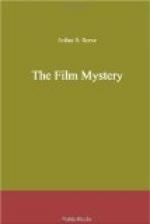During the running of the second piece the tense silence in the room was ghastly. Who was the guilty person? Who possessed such amazing callousness that an exhibition of this sort brought no outcry?
“Now”—Kennedy glanced around in the dim light, switched on between the running of the different strips—“I’m going to project the banquet scenes and show you the manner of Werner’s death.”
Scene after scene of the banquet flashed before us. Here the cutter had not been sure just what Kennedy wanted and had spliced up everything. We saw the marvelous direction of Werner, who little realized that it was to be his last few moments on earth, and we grasped the beauty and illusion of the set caused by the mirrors and the man’s skill in placing his people. Yet there was not a sound, because we knew that this was a tragedy, a grim episode in which there was no human justification whatever.
Werner rose at his place. He proposed his toast. He drank the contents of his glass. Then, his expression changed to wonderment and from that to fear and realization, and he dropped to the floor.
Kennedy’s voice, interrupting, seemed to me to come from a great distance, so powerfully was I affected by the bit of film.
“The poison used to kill Mr. Werner was botulin toxin, selected because its effects could not be diagnosed as anything other than ordinary food poisoning. When we look at the print from the second camera’s negative you will notice how quickly it acted. It was the pure toxin, placed in his glass before the wine was poured.”
Once more the unfortunate director’s death was reproduced before us.
“Struck down,” exclaimed Craig, “as though by some invisible lightning bolt, without mercy, without a chance, without the slightest bit of compunction! Why? I’ll tell you. Because he suspected, in fact knew, who the guilty person was. Because he followed that person out to Tarrytown the night the needle was removed from the portieres. Because he was a menace to that person’s life!”
Kennedy turned to the operator. “Have those other scenes come down?”
“Yes, sir!”
“All right!” Kennedy faced the rest of us again. “There was, or rather is, another person who suspects the identity of the criminal. To-day an attempt was made upon the life of Shirley. Shirley will not tell whom he suspects because he has no definite proof, yet for the mere fact that he suspects he narrowly escaped the fate of Stella Lamar and Werner.” Kennedy pressed the button. “Witness the effort to kill the man playing the part of the Black Terror.”
The print was terribly bad, in appearance almost a “dupe,” due to the speed with which it had been made. Nevertheless the two very brief scenes rushed through for this showing were more absorbingly thrilling, more graphic than anything ever to be seen even in a news reel at a movie theater.
“Notice!” Kennedy exclaimed. “He puts his hand in one pocket, he fumbles, hesitates, then finds the bottle in the other. Whoever put the poison in the vial replaced it in the wrong pocket. The film shows that very clearly. The camera proves that it was not an attempt at suicide. Yet the poison used was belladonna, selected because this victim had purchased some and because it would seem sure, therefore, that he had committed suicide.”




